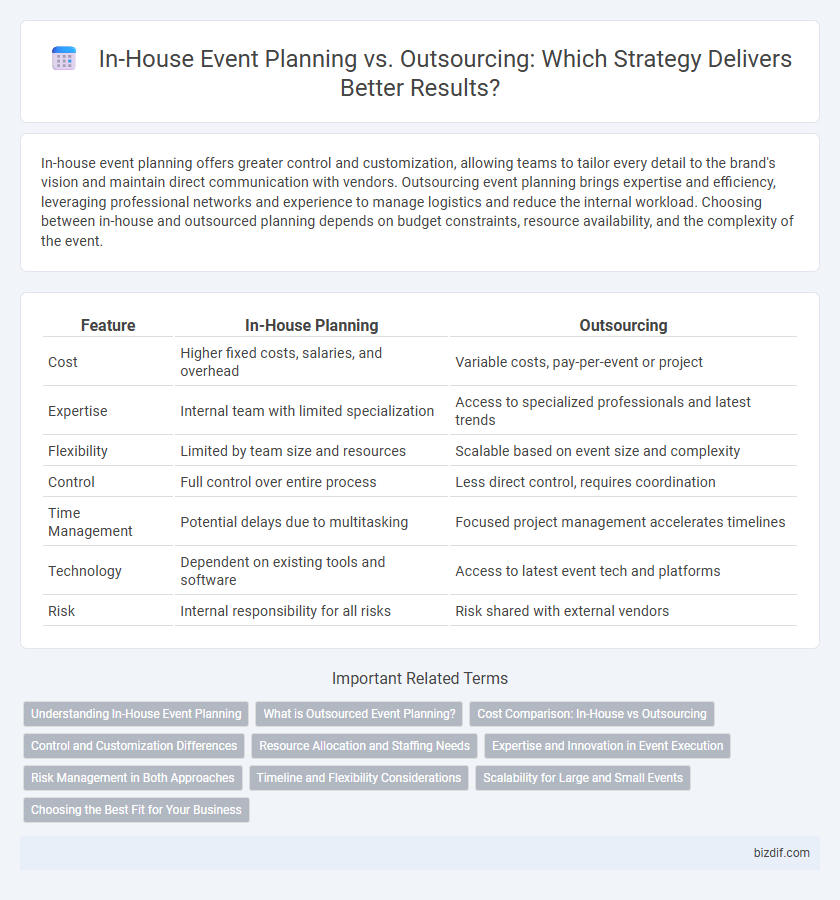In-house event planning offers greater control and customization, allowing teams to tailor every detail to the brand's vision and maintain direct communication with vendors. Outsourcing event planning brings expertise and efficiency, leveraging professional networks and experience to manage logistics and reduce the internal workload. Choosing between in-house and outsourced planning depends on budget constraints, resource availability, and the complexity of the event.
Table of Comparison
| Feature | In-House Planning | Outsourcing |
|---|---|---|
| Cost | Higher fixed costs, salaries, and overhead | Variable costs, pay-per-event or project |
| Expertise | Internal team with limited specialization | Access to specialized professionals and latest trends |
| Flexibility | Limited by team size and resources | Scalable based on event size and complexity |
| Control | Full control over entire process | Less direct control, requires coordination |
| Time Management | Potential delays due to multitasking | Focused project management accelerates timelines |
| Technology | Dependent on existing tools and software | Access to latest event tech and platforms |
| Risk | Internal responsibility for all risks | Risk shared with external vendors |
Understanding In-House Event Planning
In-house event planning offers complete control over every aspect of the event, ensuring alignment with the company's brand identity and culture. This approach leverages internal team expertise, promotes seamless communication, and allows real-time adjustments to event logistics. Understanding the benefits of in-house planning helps organizations optimize resource allocation and maintain confidentiality throughout the event process.
What is Outsourced Event Planning?
Outsourced event planning involves hiring external professionals or agencies to manage and execute event logistics, coordination, and design. This approach leverages specialized expertise, reduces internal workload, and often provides access to broader vendor networks and innovative event technologies. Outsourced planners handle tasks such as venue selection, budgeting, vendor negotiations, and on-site management, ensuring seamless execution without overburdening the host organization.
Cost Comparison: In-House vs Outsourcing
In-house event planning typically incurs fixed costs such as salaries, training, and office space, which can lead to higher overhead expenses compared to outsourcing. Outsourcing event planning often provides cost flexibility by converting fixed costs into variable costs, allowing access to specialized expertise and scalable services without the need for full-time staff. Companies analyzing event budgets should consider direct expenses, hidden costs, and the potential for cost savings through vendor negotiations when deciding between in-house planning and outsourcing.
Control and Customization Differences
In-house event planning offers greater control over every detail, allowing seamless customization tailored specifically to the brand's identity and objectives. Outsourcing event planning provides access to specialized expertise and resources but may limit direct oversight and flexibility in customization. Companies prioritizing precise control and bespoke event elements often prefer in-house teams, while those valuing efficiency and external innovation may opt for outsourcing.
Resource Allocation and Staffing Needs
In-house event planning requires dedicated internal teams, which demands significant allocation of human resources and may strain existing staff capacity during peak periods. Outsourcing event planning transfers staffing responsibilities to specialized external vendors, optimizing resource efficiency and often reducing overhead costs related to recruitment and training. Companies prioritize in-house planning for control and brand consistency, while outsourcing enables scalability and access to expert talent without long-term staffing commitments.
Expertise and Innovation in Event Execution
In-house event planning teams possess deep organizational knowledge, ensuring tailored execution aligned with brand values and internal objectives. Outsourcing event planning introduces specialized expertise and cutting-edge innovation, leveraging industry trends and advanced technologies for dynamic experiences. Combining in-house insights with outsourced creativity often results in optimal event outcomes, balancing precision and fresh perspectives.
Risk Management in Both Approaches
In-house event planning offers direct control over risk management, enabling immediate response to potential issues through internal protocols and staff familiarity with company policies. Outsourcing shifts risk management responsibilities to third-party vendors, requiring thorough vetting and clear contractual agreements to mitigate risks related to quality, timing, and compliance. Effective risk management in both approaches depends on transparent communication, contingency planning, and continuous monitoring to ensure event success and minimize disruptions.
Timeline and Flexibility Considerations
In-house event planning allows for greater control over the timeline, enabling rapid adjustments to schedules as internal teams are deeply familiar with organizational priorities. Outsourcing event planning often provides enhanced flexibility through specialized vendors who can leverage extensive networks and resources to accommodate last-minute changes. Balancing timeline precision and adaptability depends on whether the priority is direct oversight or access to expert, scalable support.
Scalability for Large and Small Events
In-house event planning offers greater control and customization but may struggle with scalability for large-scale events due to limited internal resources. Outsourcing provides access to specialized expertise and extensive networks, enabling efficient management of both large and small events with flexible scalability. Companies seeking cost-effective solutions for small events and seamless scalability for large functions often benefit from integrating both in-house teams and external vendors.
Choosing the Best Fit for Your Business
Choosing between in-house event planning and outsourcing depends on factors like budget, expertise, and control preferences. In-house teams offer greater alignment with company culture and immediate communication, while outsourcing provides access to specialized skills and scalable resources. Businesses should evaluate event complexity, frequency, and internal capabilities to determine the most cost-effective and efficient solution.
In-house planning vs Outsourcing Infographic

 bizdif.com
bizdif.com